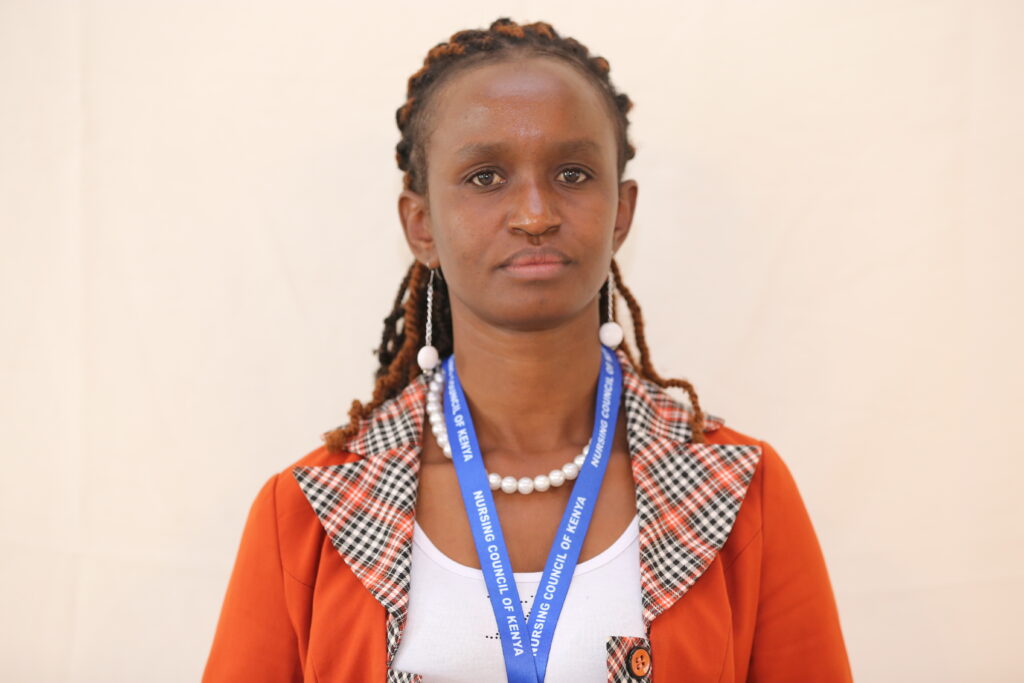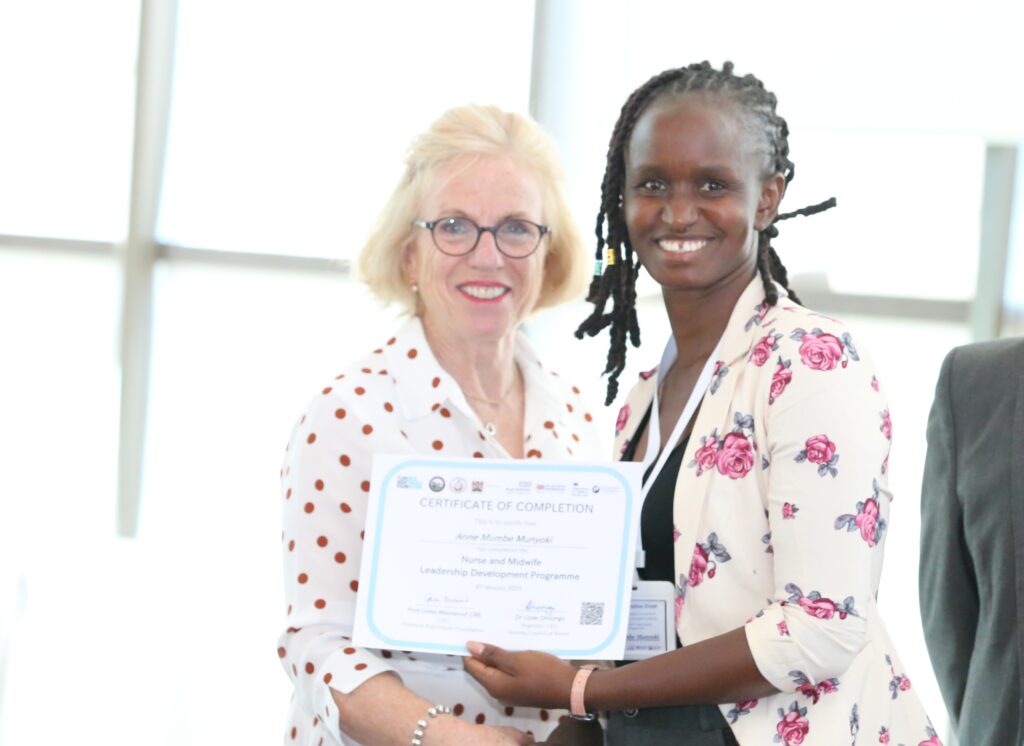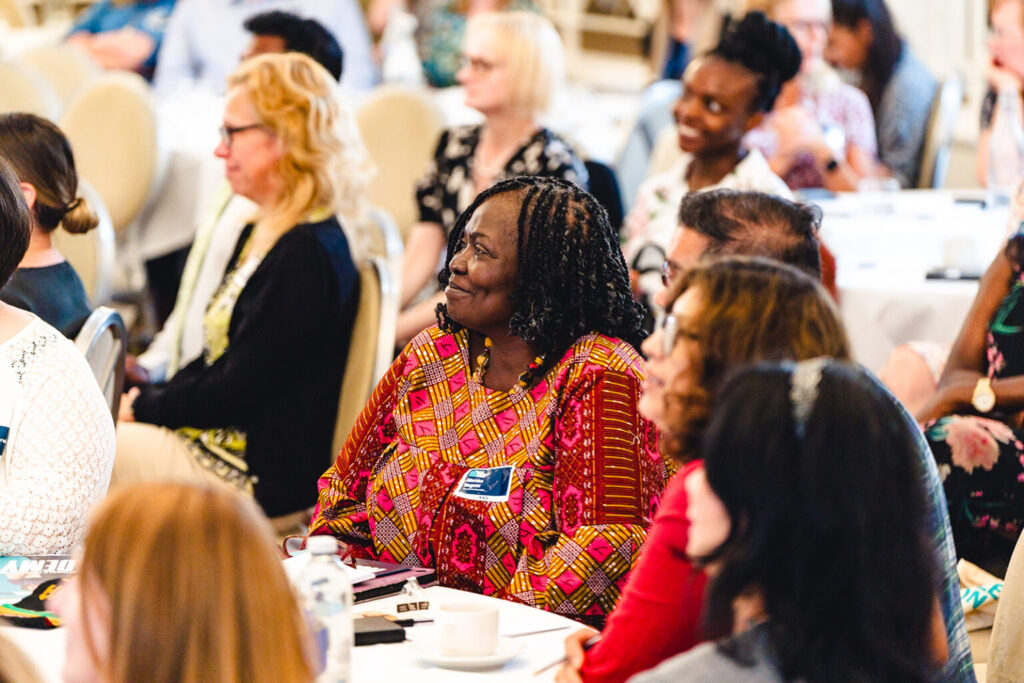Anne Mumbe is Nurse in Charge of maternal and child health family planning department at Makueni County, a Level 4 hospital in Kenya. Anne participated in FNF’s first ever leadership programme in Kenya, in partnership with the Nursing Council of Kenya. This World Health Day, hear from Anne about her experience of the programme, including her QI project improving neonatal outcomes.

Before starting this programme my confidence level was down and had not embraced the qualities and attributes of leadership as I would have wanted to. Some of the main challenges that I face as a leader in my department are staff shortages and lack of resources. There is also a challenge regarding the number of teenage pregnancies we are seeing. These girls, they dropped out of school due to the pregnancies, they come in distressed, they fear labour, they lack any support for their mental health, they are really battling a lot within themselves.
Leadership learning
Since this leadership programme started I have got a better understanding of myself as a leader. I have learned that the potential for me to be a better leader is deep inside me, and that I carry the change I need to see in the world. I need to extract this, and exercise confidence. I’ve also learned about maintaining and implementing authority. I have to come out of my comfort zone and challenge myself: challenge my knowledge and my attitude and change my behaviour, bringing a change to my workmates, my colleagues and to the patients. People always resist change. But I would say that out of this training I have learned how to better approach people, explaining to them the proposed change, listening from them, giving them clarity about the aims of the change. Then we can work together to implement that change in the best way possible.
I have learned that as a leader, I shouldn’t come with everything already said and laid out. I have learned that I need to develop the solutions with others, after identifying the problems as a group. Then we can see it together with them, we can think about this problem. Do we accommodate it or do we, do we want to change the situation? Then from there I will listen to my team: what do you think are the possible ways to approach this situation to bring a positive change to ourselves, to our families, to our career, to the community and to the clients.
My next steps within this leadership programme, were that I’d always desired to get into the research and project work space. In my community and in my workplace there are a lot of issues that I believe, if I am open to the world and I research about them, both globally and locally in Kenya, I will get solutions to the local area. So that is what I looked to do– find the space to work through several projects so that I could bring a change to the community and leave a legacy.
Change Project: Improving Neonatal Outcomes
During the leadership programme I conducted a change project in my facility. Neonatal fatality rate in new-born units in Kenya is on the rise and variable across hospitals and birth weight categories.
In Makueni County, Kenya, 1 in 22 children die before their first birthday.
Neonatal mortality has significant and far-reaching effects on the mothers, their families, society and economy in general. I therefore took it upon myself to evaluate the impact of a nurse training programme on neonatal outcomes in Kilungu Sub County Hospital where I work.
In the programme, nurses were trained on early identification and mitigation to the causative factors of neonatal deaths. The levels of knowledge and practice were evaluated pre-training, immediately after training, and after 3 months of training. After conducting the programme, nurses showed higher levels of knowledge and neonatal resuscitation skills at 1 month after the training program compared to their knowledge and practice before training.
Neonatal mortality also dropped by 47%.
Empowering nurses with the expertise to recognise and respond to neonatal emergencies ensures that they are adequately prepared to make swift, informed decisions under pressure which lowers neonatal mortality. The on-job training also showed peer support and high level of learning between health care workers participating in the team, during newborn resuscitation. My main focus now is developing and establishing a facility based periodic mentorship sessions for all staff in all cadres, with well-established assessment tools as well as feedback sessions to the county Health Department. This will be conducted using training mannequins in skills labs in every sub county Hospital, rather than conducting the mentorship on live newborns, when an incident requiring resuscitation occurs. (The witnessed reduced mortality cases were witnessed on on-job mentorship sessions on live newborns).
Currently, I am working on a budget proposal for Makueni county, with a high hope that upon its presentation, partners and the county health departments will intervene towards achieving this goal. Additionally, I look forward to conducting a similar training programme with a larger number of nurses in Makueni County to further bring down the prevalence of neonatal mortality. Lastly, it is with high expectation that this will be included in the staff appraisal to ensure it inclusion in the county workforce.
Click here to read more detail on Anne’s project.
Taking Learning from Local to Global
My key learning is that whatever the space you are seated in currently; you are not there forever. So this training has really got me looking at the world globally and knowing that I’m not alone and am not contained in a little space-a lot awaits my interventions. There is a lot of potential inside me and I have to challenge myself to bring change in whatever new opportunity I get.
I was delighted to be among the selected presenters at the final celebration event Kenya that occurred on Feb 8th in Nairobi, Kenya and I look forward to presenting the same to the County Leadership and discuss the best ways to include in the County Workforce.

This programme was funded through Global Health Partnership (formerly THET) Global Health Workforce Programme, which is funded by the UK Department of Health and Social Care (DHSC) for the benefit of the UK and partner country health sector.
FNF and the Nursing Council of Kenya (NCK) worked with Ministry of Health in Kenya, the UK-based Kenya Nurses and Midwives Association UK (KENMA-UK) and the Royal Berkshire NHS Foundation Trust to support the leadership development of mid-level nursing and midwifery managers in Kenya. The project aimed to to strengthen leadership performance, retention, and advocacy for better health outcomes across Kenya. Read more about it here.
